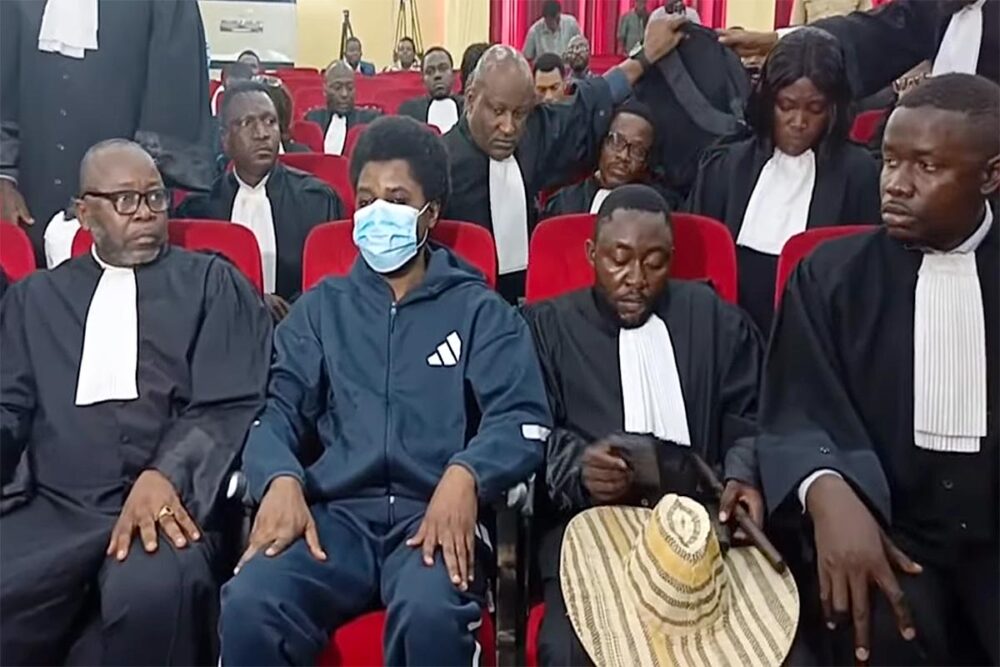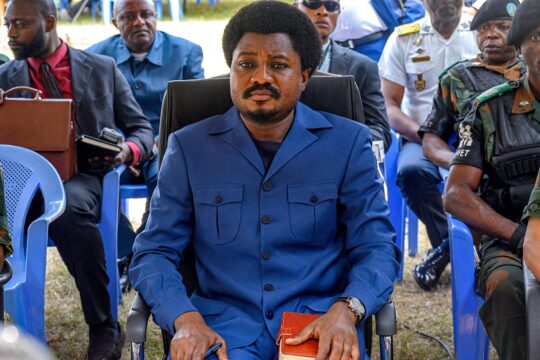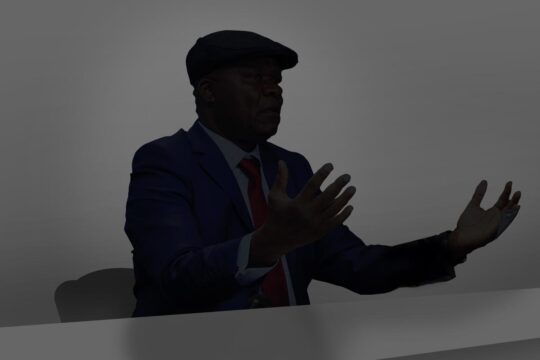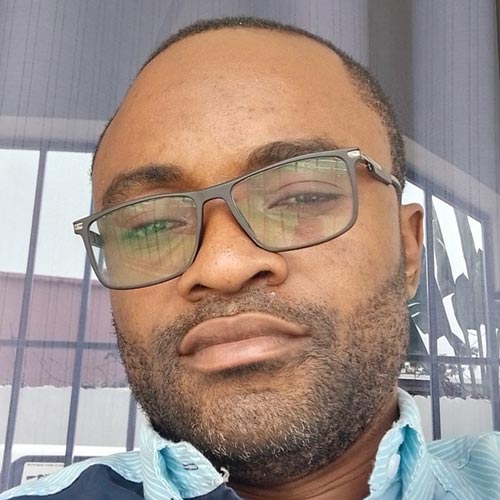Forced to resign in mid-June, Constant Mutamba had said he was ready to face justice, rejecting all the charges against him. According to the public prosecutor, the former minister of justice was guilty of illegally transferring funds, failing to comply with public procurement procedures, and awarding a contract to a “front” company.
At the opening of the trial on July 9, the defense had attempted to have the proceedings annulled, citing irregularities on the part of the national assembly: the authorization to open an investigation, which is necessary for a sitting minister, had been voted on by a show of hands, whereas the rules require a secret ballot. Also, “the person subject to the proceedings must be heard before the vote to present their defense. Our client received the invitation on the very day he was due to appear. He was in hospital”, one of the lawyers pointed out. But these arguments were deemed “unfounded” by the court.
Mutamba proclaims his innocence
“I agreed to face this reality to prove my innocence... The $19 million for which I am being prosecuted are indeed in the bank as I stand before this court. Justice minister Constant Mutamba never took a single US dollar,” he said, speaking of himself in the third person, in a firm tone, at the 23 July hearing before the court of cassation in Kinshasa, the capital of the Democratic Republic of Congo (DRC), in charge of judging him.
Regarding the awarding of the private contract to Zion Construction, which is at the heart of the case, Mutamba states: the Prime Minister’s silence for more than ten days after submitting his request for approval of the agreement with the company constitutes authorisation in his view. “The approving authority has ten days to approve the contract from the moment you submit your request. If, within ten days, the approving authority has not given its approval, the logical consequence is that the contract is tacitly approved,” confirmed Christian Kalume, an expert from the public procurement regulatory authority called to testify at the trial on 4 August.
The scandal began on 16 April 2025, as a payment order from Mutamba transferred $19.9 million from the account of the Fund for the reparation of victims of Uganda’s illegal activities in the Democratic Republic of Congo (Frivao) to an account other than the one mentioned in the procurement contract signed two days earlier between the ministry of justice and Zion Construction. The suspicious transaction was detected on the same day by Cenaref, the national financial intelligence unit.
A political trial?
Mutamba is convinced that he is facing a political trial. He has repeated this on several occasions and mentioned it in his letter of resignation addressed to president Félix Tshisekedi on 18 June. He did not hesitate to insinuate this during his often tense statements before the court of cassation. “I am not here to receive threats. If this is a conspiracy, go ahead and carry it out. I will take full responsibility,” he said at the hearing on 4 August. “This justice system that I have served with so much love has taken everything from me: my honour, my credibility, my dignity...,” he lamented on 13 August, at the end of the closing arguments.
On social networks, supporters of the 37-year-old minister have launched a campaign called “Acquit Mutamba”. Vigils are being held at his residence. Several people are stopping by to comfort him. Songs of support for the young Mutamba can be heard there.
Testimony of another former minister of justice
In his defence, Mutamba has requested the appearance of several prominent figures: the executive secretary of the national financial intelligence unit (Cenaref), the general director of the one-stop shop for business creation, the former minister of justice and even the current prime minister, Judith Suminwa. On 6 August, the latter asked the court to excuse her from appearing for “reasons of state”, explained judge Jacques Kabasele Nzembele. The executive secretary of Cenaref also did not wish to testify.
However, Rose Mutombo, former minister of justice, did appear at the hearing on 6 August. She discussed the distribution of funds paid by Uganda since 2022. A large part, she explained, goes to the Frivao account and another part to the government account [in accordance with the ruling of the International Court of Justice]. Both accounts were opened before she took office as minister of justice, she said. “When the money from Uganda arrives in the ministry of justice’s account, the victims’ share is then transferred to Frivao’s account,” she explained.
As for professor Amisi Herady, director of the one-stop shop for business creation, he explained that Zion Construction was indeed created on 28 March 2024 and that its first partners – against whom a search warrant has been issued – had sold their shares before the contract with the ministry of justice, the supervisory authority of Frivao, was signed on 14 April 2025, for the construction of a prison in Kisangani, the provincial capital of Tshopo in north-eastern DRC, and the scene of the “six-day war” between the Rwandan and Ugandan armies in June 2000. “We are not in a position to confirm the viability or reliability of a company. But what we are able to confirm is its legal existence,” added Herady.
The other eagerly awaited intervention was that of Rawbank, where the $19.9 million paid by Frivao are currently held. The testimony of a bank official contradicts Mutamba’s statement that the money is in an escrow account, meaning a bank account specially designated to hold funds temporarily, pending a further decision. “At Rawbank, there is a customer with a current account in the name of Zion Construction SARL, number 25101-01145175001-47 USD, opened in the ledger,” said Hervé Sesongo, the bank’s representative who testified at the trial.
To date, “Zion Construction cannot access this account because there are protective measures in place, notably by Cenaref and the public prosecutor”s office,” he added.
10 years of hard labour requested by the prosecution
After six days of hearings, the Court of Cassation concluded the proceedings on 13 August. In his closing speech, advocate general Sylvain Kalwila requested 10 years of hard labour and 10 years of ineligibility, with deprivation of access to public office after serving his sentence.
The public prosecutor, who described the defendant Mutamba as a “delinquent”, highlighted several points in his closing speech: in particular, the use of a private agreement procedure, the former minister’s decision to exclude certain technical and legal services, the execution of the contract without obtaining a notice of no objection, and the fictitious nature of the company, which has no registered office, no staff and no bank guarantee.
“The defendant, whom the public prosecutor presents as a criminal, is curently seen as a representative of the youth within the political class,” the defence retorted in its closing arguments.
Guilty of embezzlement of public funds
On Tuesday, 2 September, for the pronouncement of the verdict, the court of cassation was placed under high security to prevent any potential unrest from Mutamba’s supporters. Mutamba appeared at the hearing wearing a navy blue tracksuit and a surgical mask covering his face.
In its ruling, the court of cassation found that “the repeated violations of procedural rules and the haste in awarding the contract were intended to divert state funds to fraudulently enrich the company Zion Construction”.
Consequently, the former minister was found guilty of embezzlement of public funds and sentenced to three years” of forced labour, generally converted into prison sentences in the DRC, as forced labour is no longer practised. The court also sentenced him to a five years disqualification from voting and from holding public office as well as ineligibility.
Mutamba left the court of cassation with his fist raised, without any comment. As the court of cassation sits in both first and second instance, Mutamba has no possibility of appeal.








